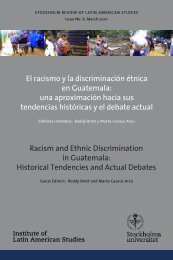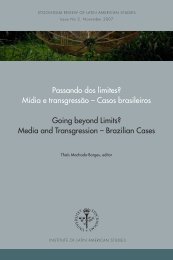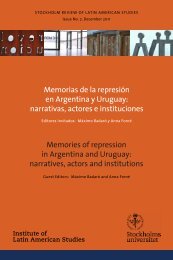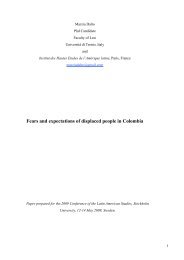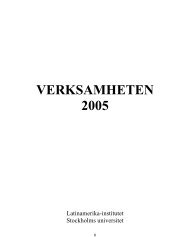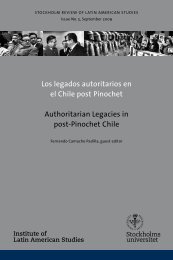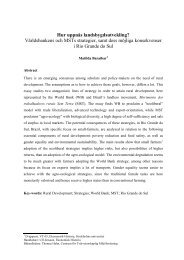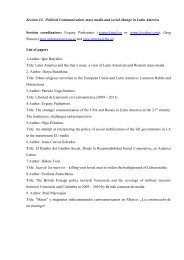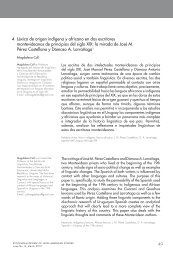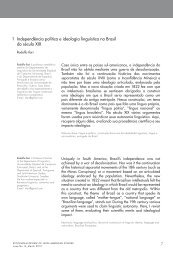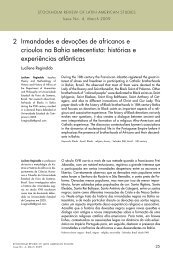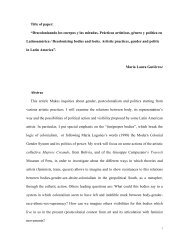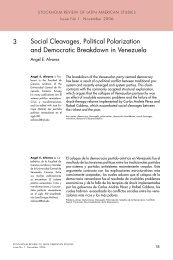Venezuelan Politics and Society in Times of Chavismo PolÃtica y ...
Venezuelan Politics and Society in Times of Chavismo PolÃtica y ...
Venezuelan Politics and Society in Times of Chavismo PolÃtica y ...
Create successful ePaper yourself
Turn your PDF publications into a flip-book with our unique Google optimized e-Paper software.
Tercermundismo <strong>and</strong> <strong>Chavismo</strong><br />
Daniel Hell<strong>in</strong>ger<br />
ismo petrolero no longer could serve as a populist<br />
rally<strong>in</strong>g cry. Corruption <strong>and</strong> <strong>in</strong>equality were now<br />
associated with democracy, not with military rule.<br />
Far from advanc<strong>in</strong>g <strong>in</strong>to the core as a modern society,<br />
<strong>Venezuelan</strong>s felt themselves reced<strong>in</strong>g <strong>in</strong>to the<br />
periphery.<br />
After 1993, challenges to the Punto Fijo system<br />
gestated among three sectors: (1) social movements<br />
<strong>and</strong> the organized work<strong>in</strong>g class (2) the middle<br />
class, oil executives <strong>and</strong> bus<strong>in</strong>ess sectors, <strong>and</strong> (3) the<br />
military. The first two were visible, the third formed<br />
cl<strong>and</strong>est<strong>in</strong>ely. None, fully succeeded, but the military<br />
conspiracy formulated by Hugo Chávez <strong>and</strong><br />
his comrades would eventually deal a decisive blow<br />
to the old regime. In short order they were able to<br />
sweep away many <strong>of</strong> the key political <strong>in</strong>stitutions<br />
<strong>of</strong> the old regime. The traditional political parties<br />
associated with Punto Fijo crumbled before his political<br />
<strong>of</strong>fensive, undertaken to write a new “Bolivarian<br />
Constitution.”<br />
With the collapse <strong>of</strong> the old party system <strong>in</strong><br />
the December 1998 elections, <strong>Chavismo</strong> came to<br />
dom<strong>in</strong>ate the state apparatus. However, the political<br />
terra<strong>in</strong> was less favorable than it appeared.<br />
Promises to create a more participatory (“protagonistic”)<br />
democracy <strong>and</strong> address the needs <strong>of</strong> the<br />
poor proved less tractable to the new regime than<br />
demolish<strong>in</strong>g old political <strong>in</strong>stitutions. Opponents<br />
were <strong>in</strong> disarray, but they rema<strong>in</strong>ed entrenched <strong>in</strong><br />
key parts <strong>of</strong> civil society, especially <strong>in</strong> the media.<br />
After 1999, polls began to record a steep decl<strong>in</strong>e<br />
<strong>in</strong> the president’s popularity rat<strong>in</strong>gs. By 2002, he<br />
seemed vulnerable to an overthrow. A massive protest<br />
march <strong>of</strong> April 10, 2002 seemed to confirm<br />
Chávez’s change <strong>in</strong> fortunes. Internationally, ultra<br />
conservatives <strong>in</strong> Wash<strong>in</strong>gton signaled their displeasure<br />
with the regime. After the mass demonstration<br />
was apparently violently repressed (versions <strong>of</strong><br />
who was responsible for the violence have yet to<br />
be <strong>in</strong>vestigated <strong>in</strong>dependently), the opposition conv<strong>in</strong>ced<br />
military sympathizers to deta<strong>in</strong> Chávez <strong>and</strong><br />
dem<strong>and</strong> his resignation. However, the coup attempt<br />
generated a backlash <strong>of</strong> protest that contributed to<br />
the restoration <strong>of</strong> the president to <strong>of</strong>fice, leav<strong>in</strong>g<br />
the political climate more polarized than ever. The<br />
subsequent period saw an upsurge <strong>in</strong> organization<br />
<strong>of</strong> Bolivarian Circles, while the opposition moved<br />
aga<strong>in</strong> to force a presidential resignation or second<br />
coup attempt by launch<strong>in</strong>g general strike <strong>in</strong> December<br />
2002. By the end <strong>of</strong> January it was obvious that<br />
Chávez had weathered the storm once aga<strong>in</strong>, but<br />
the political situation rema<strong>in</strong>ed far from stable.<br />
<strong>Chavismo</strong> as an ideology<br />
Various ideological <strong>in</strong>fluences shaped the worldview<br />
<strong>of</strong> chavismo. Because <strong>of</strong> the program <strong>of</strong> plac<strong>in</strong>g cadets<br />
<strong>in</strong> civilian universities, Chávez <strong>and</strong> his fellow<br />
conspirators came <strong>in</strong> contact with leftist <strong>in</strong>tellectuals,<br />
some <strong>of</strong> whom would be given important posts<br />
<strong>in</strong> his adm<strong>in</strong>istration. <strong>Chavismo</strong> reflects not only<br />
<strong>Venezuelan</strong> nationalism but ideas drawn from an<br />
eclectic range <strong>of</strong> leaders <strong>and</strong> th<strong>in</strong>kers from Fidel<br />
Castro to Tony Blair (“third way”) <strong>and</strong> Norberto<br />
Ceresole (1999), a self-exiled Argent<strong>in</strong>e sociologist<br />
who <strong>of</strong>fered a neo-fascist critique <strong>of</strong> the post-Cold<br />
War dom<strong>in</strong>ance <strong>of</strong> the United States, t<strong>in</strong>ged with<br />
anti-semitism. Chávez has eschewed the latter but<br />
found <strong>in</strong> the ideas <strong>of</strong> Ceresole (who has s<strong>in</strong>ce broken<br />
with Chávez) validation for his conception <strong>of</strong><br />
a fus<strong>in</strong>g <strong>of</strong> civilian <strong>and</strong> military components <strong>in</strong> defense<br />
<strong>of</strong> national values <strong>and</strong> <strong>in</strong>terests.<br />
Opponents have made much <strong>of</strong> the relationship<br />
between Chávez <strong>and</strong> leaders <strong>of</strong> countries that the<br />
United States labels “rogue states,” his refusal to<br />
cooperate with the U.S. drug war on Colombia,<br />
allegations that his adm<strong>in</strong>istration tried to harbor<br />
Vladimir Montes<strong>in</strong>os (the renegade Peruvian<br />
strongman), <strong>and</strong> his friendly relations with Colombian<br />
guerrillas. After devastat<strong>in</strong>g floods destroyed<br />
the transportation <strong>in</strong>frastructure along the littoral,<br />
Chávez refused to allow American military eng<strong>in</strong>eer<br />
units to deploy <strong>and</strong> help <strong>in</strong> the rescue <strong>and</strong><br />
rebuild<strong>in</strong>g efforts. At the Summit <strong>of</strong> the Americas<br />
<strong>in</strong> Quebec City <strong>in</strong> 2001, Chávez refused to endorse<br />
the resolution that called for condition<strong>in</strong>g membership<br />
<strong>in</strong> a hemispheric free trade zone on electoral<br />
democracy.<br />
What these actions all have <strong>in</strong> common is resistance<br />
to uni-polar dom<strong>in</strong>ation <strong>of</strong> the world by the<br />
United States. Relations with countries like Iraq <strong>and</strong><br />
Stockholm REVIEW OF Lat<strong>in</strong> American Studies<br />
Issue No 1. November 2006



